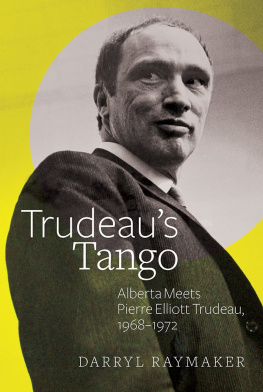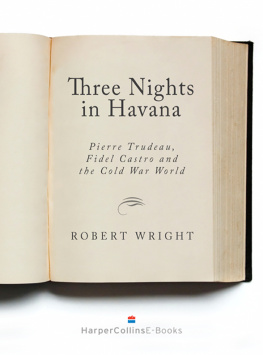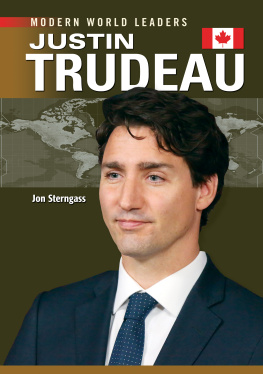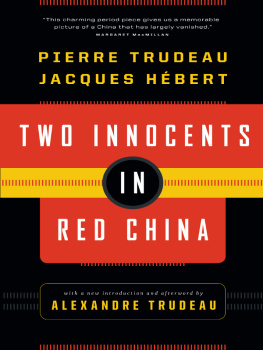Contents
For The Neighbour
Still, let me know before you set out.
Come knock on my door
and I will walk with you as far as the garden
with one hand on your shoulder.
I will even watch after you and not turn back
to the house until you disappear
into the crowd of maple and ash,
heading up the hill,
piercing the ground with your stick.
Last verse, Billy Collins, Directions
Foreword
BY JUSTIN TRUDEAU
One of the most wonderful perks about being my fathers son is that even now, twenty years after he left public life, and four years after his passing, an extraordinary number of people still stop me with huge smiles on their faces to tell me about the time they met him, or saw him, or even simply how much he touched their lives. I have always been fascinated to see how my fathers image lives on within each individual in a unique way.
So when Nancy approached Sach and me with the idea for this book, I was, needless to say, intrigued. To a large extent, I know that he would have been wary of a book about him, and not about his achievements, his writings, or, at the very least, his thoughts. He always seemed mildly uncomfortable with the cult of personality aspect of his persona, and might have been concerned that a book on his interactions with others, on the way they perceived him, would feed that. But on the contrary, I think this collection shows how very real he was as an individual.
As well as I knew my father, there are many sides of him that I rarely saw fully in action (its not like he brought the Constitution home to the dinner table). So from a personal standpoint, I have delighted in reading these stories. Some are emotional, some are very funny, some may be a bit of a stretch, but all show him from a different angle, revealing a different way he impacted the people around him.
A slight warning: my father was a man who, to put it mildly, tended to have a certain effect on anyone who met him. So while care has been taken to verify the stories in this book, it is natural that certain embellishments may have slipped into the tales over the years and the tellings. And that, to my mind, is as fascinating as anything else: to see how people reveal themselves through their accounts of interactions with my father.
The book you are about to discover is filled with gentle laughter, clever observations, and poignant memories of the private man who, despite himself, played a very public role in the consciousness of our nation. But perhaps its easier for me to simply say that you are about to meet a man whose sons never had to grow out of the my dad can kick your dads ass phase. And hopefully youll understand why we all loved him so much.
Preface
Many people have asked how Pierre and I first met. The more appropriate question is: how did we nearly first meet? I was supposed to be introduced to him in the back garden of our family home in Vancouver, where he was spending the afternoon (little did I know) swimming in the pool and jumping on the trampoline. He was the freshly elected prime minister, a job title that on this day would mean nothing but fierce pain to me. I had just walked home from school, aged twelve, fully intent on sneaking in a few jumps on the tramp, as usual, before changing out of the dreaded school uniform. But I was briskly informed that not only was my trampoline off limits, so was the back garden and pool. Even with all the pandemonium and competition that came with being the youngest of seven children, I had never heard such a ridiculous admonition.
But Ive done nothing wrong, I bleated, today!
It was explained to me who he was. I shrugged (or so the story has been embellished) and said, So what? And then I threw a fit, and was sent to my room for the remainder of Pierres visit. I saw him out my bedroom window, and felt something close to loathing.
So we never met then.
A decade or so later, when we did, trampolines became a running joke between us. Trampoline became a code word. It meant get me out of here.
Wonder if they have a trampoline, hed whisper at dinner parties that bored him. If they had a trampoline, Id stay longer.
Even in his final few months, he never lost his sense of humour about the joke. The last time we went to his place up north, shuffling towards the house, he stopped and, waving his hand, said, See, I have a trampoline! Want to try it?
Getting this book done over the past two and a half years was like being permanently on a trampoline, leaping and bouncing and doing backflips after front-flips, and leaping higher again, without much repose. That is to say, beyond it being a labour of love and all the emotion that comes with that kind of covenant, this book damn near put me in the loony bin for life. Ask any number of contributors what it was like to deal with me. One contributor neatly summed up the situation (when I really was on deadline and their essential piece wasnt close to being finished) by referring to me as Madame Slave Driver in various e-mailed missives. I accepted his title graciously, telling him to stop horsing around and get his copy in.
I contacted over three hundred people around the world who knew Pierre, worked for him or against him, danced with him, heard him quote poetry or less diplomatic phrases, watched him (both the press and the RCMP ), canoed with him, entertained him, or spoke with him on spiritual matters. My intention was to show the personal side of Pierre, to make him human, to let readers see what he was like as a friend, an employer, a travelling companion, and most of allin his favoured roleas a father.
I received over two hundred responses, many of which didnt make it into this volume. One of the first pieces in was from Jimmy Carter. Then came, shortly after, submissions from a priest, a provincial premier, an old friend, and then one of his RCMP bodyguards. What struck me was not simply the intimacy and generosity of their memories, but how Pierre was revealed in (as one contributor put it so beautifully), the softer protocol of private conversation.
What I didnt receive, until the last possible deadline, were some forty key stories I neededalmost without exceptionfrom those people closest to him. They, like me, found the whole remembering and writing enterprise fraught with emotion. But I prodded and begged them, abused their answering machines, and bothered their consciences until they became suffciently aware that I wasnt going to let up, that the only way to get rid of me was to get writing. Thankfully, they did. Otherwise wed still be on the phone now, negotiating our versions of the notwithstanding clause. Id say to them, over and over, Notwithstanding the fact that, yes, that is true, Ive not written my piece for the book either because I havent had time
At the end of the day, I tried rigorously to live by two abiding notions. One was that it didnt matter who you are, or how famous you were, or how private your access to Pierre was. If you had something unique to say, if what you revealed was interesting, great; if not, you didnt make the cut.
The other abiding rule was much less tricky. If stuff came in that was inappropriate, too personal, or inaccurate, I asked myself this simple question: What would Pierre think?
As well, I had help from Justin and Sacha, the boys as we euphemistically continue to call them. Sacha (when he was not out in some war zone chasing danger) was very capable at assessing the flaws. Justin was not only a meticulous line editor in numerous readings of the manuscript, but he was a steadying and consoling voice all the way through the journey. His support, his advice, his conscience, his humour, all were delightful revelations.
Few people took Pierre on, no matter what your relationship with him was (real, perceived, or of your own making) without knowing he was a formidable intellect possessing rapid-fire retorts when your logic was shaky. He expected you to have your argument or plea well thought out. He expected that because he had demanded it of himself. Fewer people still, saw that vulnerable side of him he protected so successfully. He made calculated forays out of his privacy, one contributor writes. Indeed, in public life and in private life, he did. I knew that vulnerable side of him. I knew him well, in many of his moodsplayful, authoritarian, loving, bored, challenging, philosophical, curious, rhetorical, independent, daring. Always, daring.
Next page





